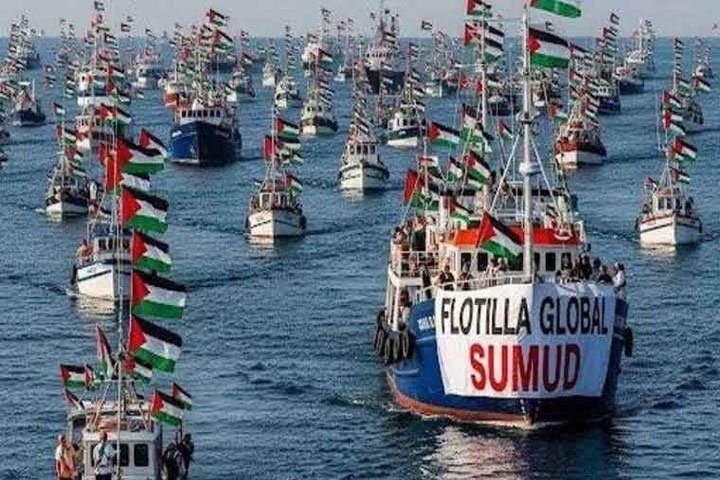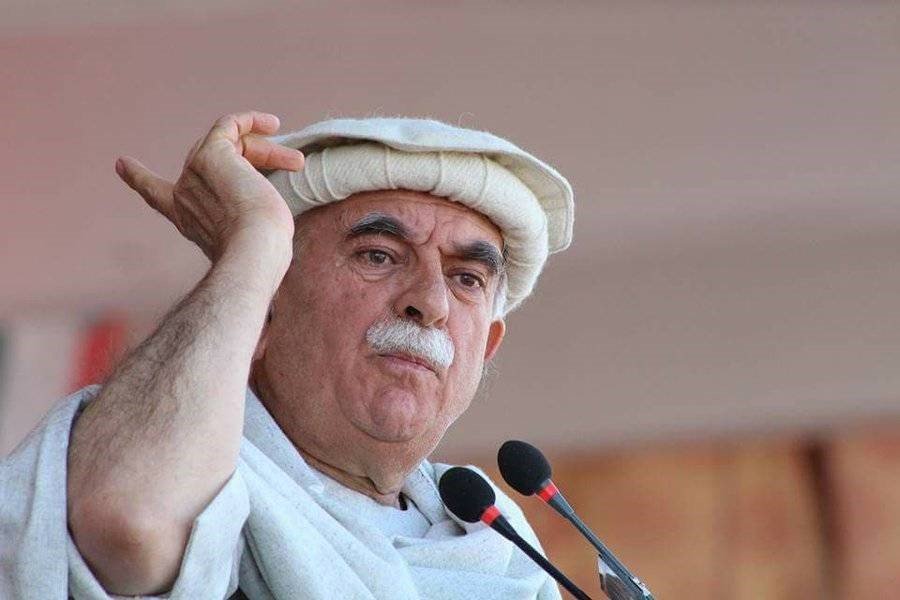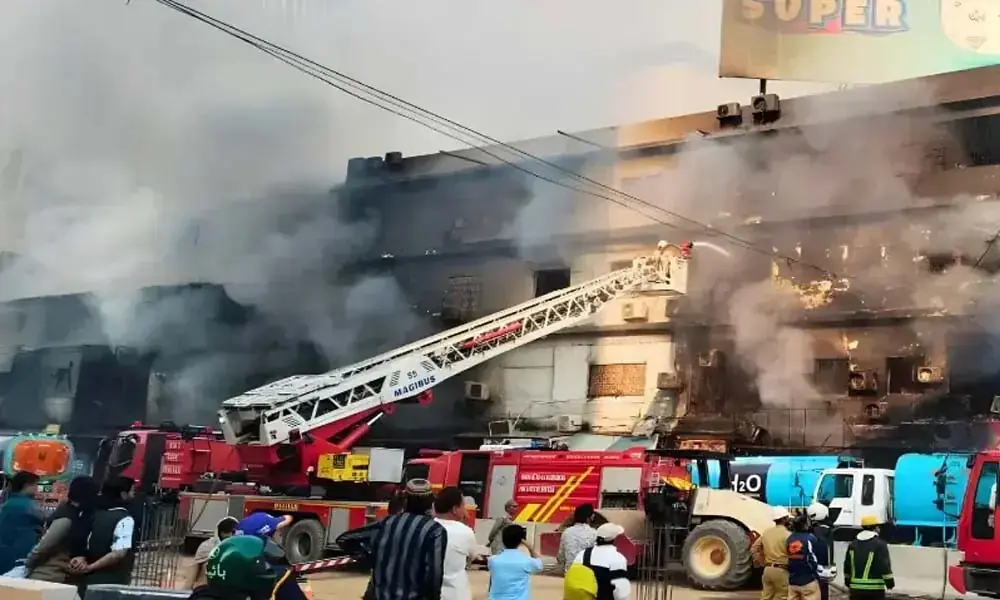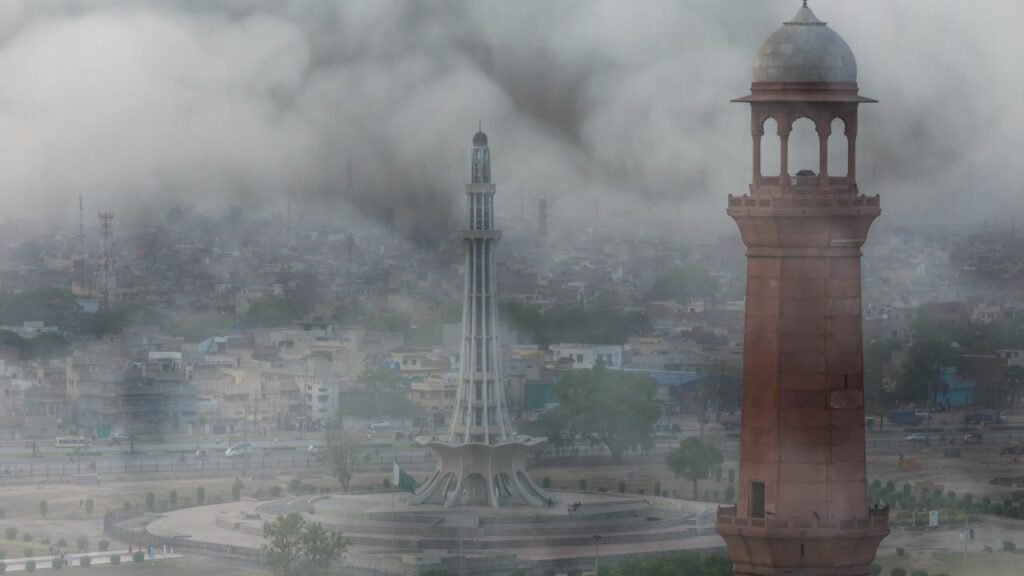Arshad Mahmood Awan
The interception of the Global Sumud Flotilla by Israeli forces in international waters has sparked outrage across the globe, transforming a humanitarian voyage into a diplomatic and moral crisis. What began as a mission to deliver urgent food and medical supplies to the besieged people of Gaza has ended with the detention of more than 443 activists, including parliamentarians, human rights defenders, and globally renowned figures such as Greta Thunberg. Among the detainees is Pakistan’s former senator Mushtaq Ahmad Khan, who was leading a Pakistani delegation onboard. His arrest has become a moment of reckoning for Pakistan, which has demanded his immediate release along with all other activists, insisting that the flotilla carried only medical equipment, food, and the hope of relief for Gaza’s starving population.
The flotilla comprised over 40 civilian vessels, an unprecedented show of solidarity from across continents. Doctors, students, aid workers, activists, and elected officials joined together with a single mission: to breach the blockade through moral defiance and humanitarian service. This was no military challenge to Israel; rather, it was a reminder that the world has not abandoned Gaza. Yet Israel’s aggressive interception tells a different story — one in which even food, medicine, and compassion are treated as existential threats.
Reports indicate that Israeli forces deployed water cannons, stun devices, and armed escorts to seize the ships, transferring the detained activists under heavy guard. Just one vessel reportedly escaped briefly into Gaza’s waters before its communications went silent. The images of unarmed civilians facing military might have fueled global condemnation. South Africa has demanded answers on the detention of Mandla Mandela, the grandson of Nelson Mandela. Italy’s trade unions have declared strikes in protest, while Colombia has gone as far as expelling Israel’s diplomatic mission. These reactions illustrate the widening isolation of Israel’s policies and the deepening sense of moral outrage in civil society across continents.
The flotilla’s interception also highlights a grim truth: Gaza is now in the grip of famine. The United Nations has confirmed that hunger has reached catastrophic levels, with parts of the population facing starvation. In such a context, the supplies carried by the flotilla were not symbolic; they were a lifeline. Israel’s decision to block this aid reveals the extent to which humanitarian principles have been eroded in the pursuit of military strategy. International law, particularly the Geneva Conventions, obligates occupying powers to ensure the delivery of essential supplies to civilian populations. By treating humanitarian passage as a threat, Israel risks setting a precedent where compassion itself is criminalized.
For Pakistan, the detention of Mushtaq Ahmad Khan carries particular significance. It underscores the country’s active engagement in international solidarity with Gaza and positions Islamabad as a vocal critic of Israel’s policies. Pakistan’s demand for his release is not merely about one man’s freedom; it symbolizes the right of nations and individuals to stand up for humanitarian values without facing persecution. This episode may become a turning point in Pakistan’s foreign policy discourse, pushing it to advocate more forcefully for humanitarian corridors and accountability mechanisms in international forums.
Beyond immediate diplomatic pressure, the Global Sumud Flotilla represents a moral test for the international community. Rights organisations have condemned the raid as illegal, while legal experts warn that treating aid convoys as hostile targets undermines the foundations of humanitarian law. If the detained activists are not released and a viable sea corridor to Gaza is not established, the message sent to the world is chilling: even compassion can be besieged, even humanity can be blockaded.
The broader implications extend beyond Gaza. If Israel can criminalize the act of delivering food and medicine, it emboldens other states to shut down humanitarian lifelines under the guise of security. This risks normalizing a dangerous precedent where states place their strategic objectives above the survival of civilians. The world must respond decisively to prevent such a trajectory.
The moral weight of the Global Sumud Flotilla is clear. It was not simply a convoy of ships; it was a declaration of global conscience, an act of civil resistance against the politics of siege and starvation. Its interception is not just an affront to the people of Gaza but to the principles of international humanitarian law and to the moral fabric of global society. Unless the world acts to secure the release of detainees and establish safe humanitarian passage, the legacy of this flotilla will not be its courage but the world’s silence.















